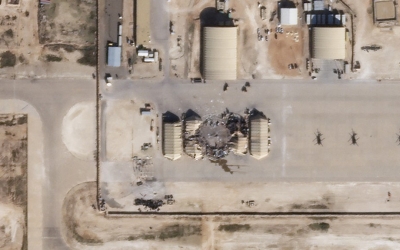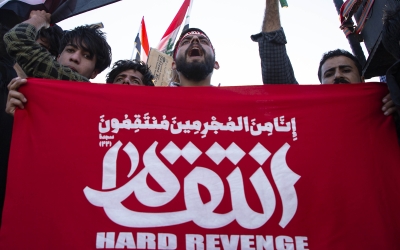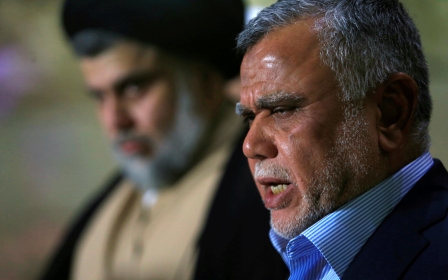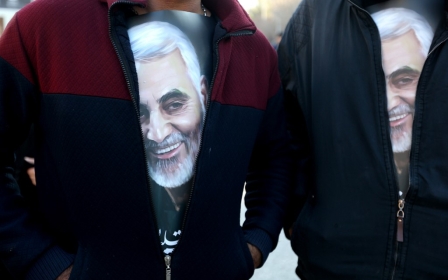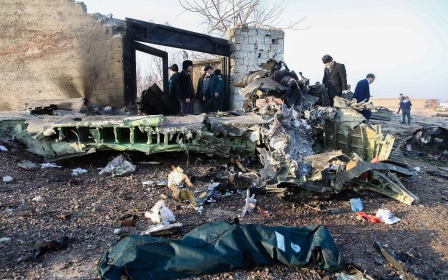When war drums beat for Tehran: Iranian-Americans on 10 days from hell
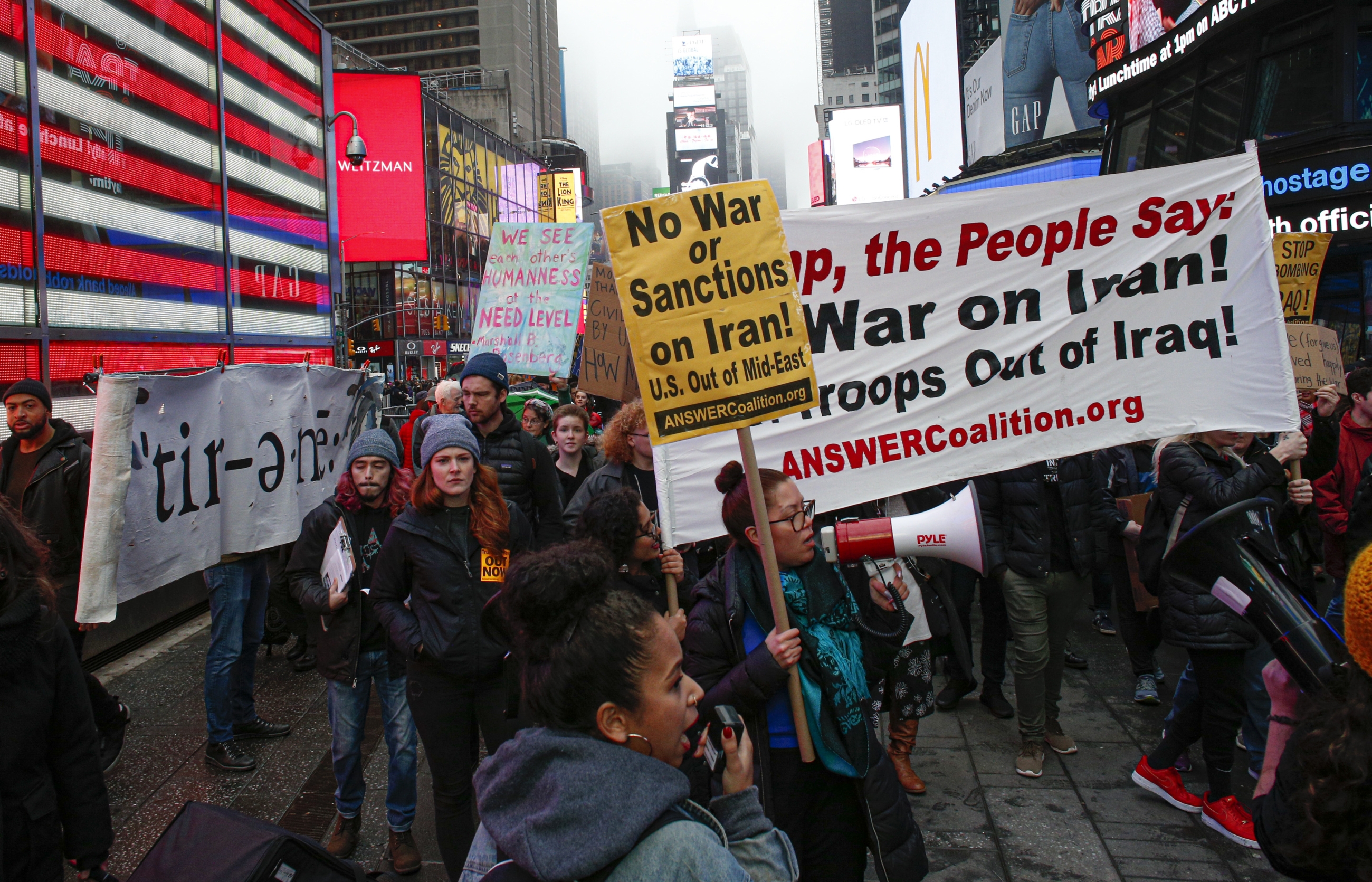
Iranian-Americans are trying to pick up the pieces after enduring 10 days from hell, when two of the countries they call "home" almost went to war.
The assassination of Qassem Soleimani by a US drone strike on 3 January set in motion a series of events that placed the US at risk of starting a new conflict in the Middle East.
Iran had promised "severe revenge" after Soleimani's killing, with Tehran firing a salvo of missiles at two military bases in Iraq housing US forces.
While the Ain al-Assad airbase was "shredded" by the bombing, Iran had notified the facility well in advance and the US reported no casualties.
Though military escalations have since calmed, with Trump even tweeting "all is well," the 900,000 strong Iranian-American community is still trying to come to terms with repercussions from the events.
New MEE newsletter: Jerusalem Dispatch
Sign up to get the latest insights and analysis on Israel-Palestine, alongside Turkey Unpacked and other MEE newsletters
'Sanctions are a form of warfare, and ... many working class Iranians already feel they are in a time of war,'
- Hoda Katebi, activist
"It was the impending feeling of doom," activist Azadeh Shahshahani told Middle East Eye.
"Things were moving so fast, we knew anything could happen," Shahshahani added.
Meanwhile, Niaz Kasravi, the founder and director of the California-based Avalan Institute, said her emotions had "been a rollercoaster".
In the last fortnight, several Iranian-Americans told Middle East Eye that the scale of vitriol directed at Iran, by both US lawmakers and media alike, had left them feeling vulnerable.
Chicago-based activist Hoda Katebi said the surveillance machinery of the US had been activated to "other" Iranians, as it had done with so many minorities.
The detention of Iranian-Americans at ports of entry is on the rise, while profiling of the community in certain cities with a sizable Iranian population, like Los Angeles, has been reported.
"This has been a watershed moment for the community here in the US and even in Iran," Katebi told MEE.
"We have all been forced to process fast-changing events and deal with information overload. But I think people understand more than ever before that the US has consistently showed aggression to Iranians."
'Not over'
The spectre of war with Iran also emboldened white supremacists and racists on social media.
Katebi, for instance, said her Twitter timeline over the past 10 days had been inundated with threats to her life, emotional abuse as well as threats of sexual violence.
Kasravi said that the way Iranian-Americans had been smeared and profiled felt like a deliberate attempt "to make us feel like a minority".
It was also just the latest in a long line of humiliating decrees imposed on Iranians, including travel limitations via the Muslim Ban and ongoing sanctions that have had implications on ordinary Iranians.
Even prior to the events of the past two weeks, Iranians had been complaining about the State Department cancelling visas of students en route to the US. On arrival, these Iranian students were deported and denied entry.
Kasravi said that her biggest concern was that while "military action might have been avoided, none of the issues that led to this situation have been addressed".
"Most of us know that this is not over," she added.
The Trump administration has justified Soleimani's killing, saying it was acting in self-defence to prevent a series of imminent attacks on Americans.
But its refusal to provide evidence for an 'impending attack' has left analysts wondering whether the administration was only looking for a reason to deflect attention away from the president's impeachment case.
"This idea that the fate of some 81 million people rested at the mercy of Donald Trump was just [too much]," said Shahshahani, recounting the days immediately after the drone strike.
Comyar Salehomoum, a 26-year-old law student based in Newark, said he was still trying to understand the events of the past two weeks.
"It took me a few hours to process that the US had killed Soleimani. I just couldn't believe it," he said.
'Sanctions are a form of warfare'
Following Soleimani's assassination, millions took to the streets of Iran in a show of respect and unity in the face of US provocation.
When Iran retaliated by striking two bases in Iraq, it also accidentally shot down a Ukrainian plane, killing 176 people on board.
The incident sparked outrage across the globe and ignited new anti-government protests across Iran.
While US-Iran tensions are decades old, under Trump the schism between the two countries has deepened.
'When governments play these games, innocent civilians pay the price,'
- Niaz Kasravi, director of the Avalan Institute
Trump has gutted the Obama-era nuclear deal with Iran and initiated a "maximum pressure" campaign against Tehran in an attempt to "force" it back to the negotiating table.
The imposition of additional sanctions over the past week left many in the community seething at the effects these could have on ordinary Iranians.
It was also unclear how they would help diffuse or alleviate tensions.
"Sanctions are a form of warfare, and sanctions are a form of escalation," Katebi said.
"Many working-class Iranians already feel they are in a time of war. Maybe not for Americans, but for Iranians, they are [under attack].
"So we need to use this opportunity to call for an end to sanctions and call for an end to the Muslim ban."
Bipartisan Hatred of Iran
On Tuesday, a bipartisan resolution was introduced in Congress to stop the US presidency from declaring war on Iran. The resolution doesn’t stop war with Iran, however, it only calls for better accountability from the presidency.
Whereas there are activists like Salehomoum, the law student from Newark, who believes Trump's actions in the region have only created "more headaches for himself", and that he would "live to regret it", others aren't convinced this matter is about to go away.
Activists who have been calling on US lawmakers to address Trump's dangerous approach to Iran say that they have consistently battled to find an audience with those Democratic leaders who purportedly oppose Trump. The anti-Iran bias is deep-seated across both sides of the aisle, they say.
"It is not uncommon to hear right-wing talking points about Iran from all sides of the political spectrum," said Sepehr Makaremi, 26, an activist based in NYC.
For Shahshahani and Katebi, the hard task of defending Iranian-Americans from daily prejudice continues.
Katebi said that Iranians have been reaching out to her on social media for support and activists are working around the clock to secure legal advice and assistance for those impacted by the new measures.
"Everyone thinks they are the only ones being impacted, when it is actually across the board," she said.
Under the veneer of resilience and unyielding toughness, Iranian-Americans are reading deeply into the fate of Ukrainian Flight PS752.
Kasravi says that the story of the plane is the tragic story of war itself.
"When governments play these games, innocent civilians pay the price," she said. "The tragedy is symbolic of that," she said.
Middle East Eye delivers independent and unrivalled coverage and analysis of the Middle East, North Africa and beyond. To learn more about republishing this content and the associated fees, please fill out this form. More about MEE can be found here.


